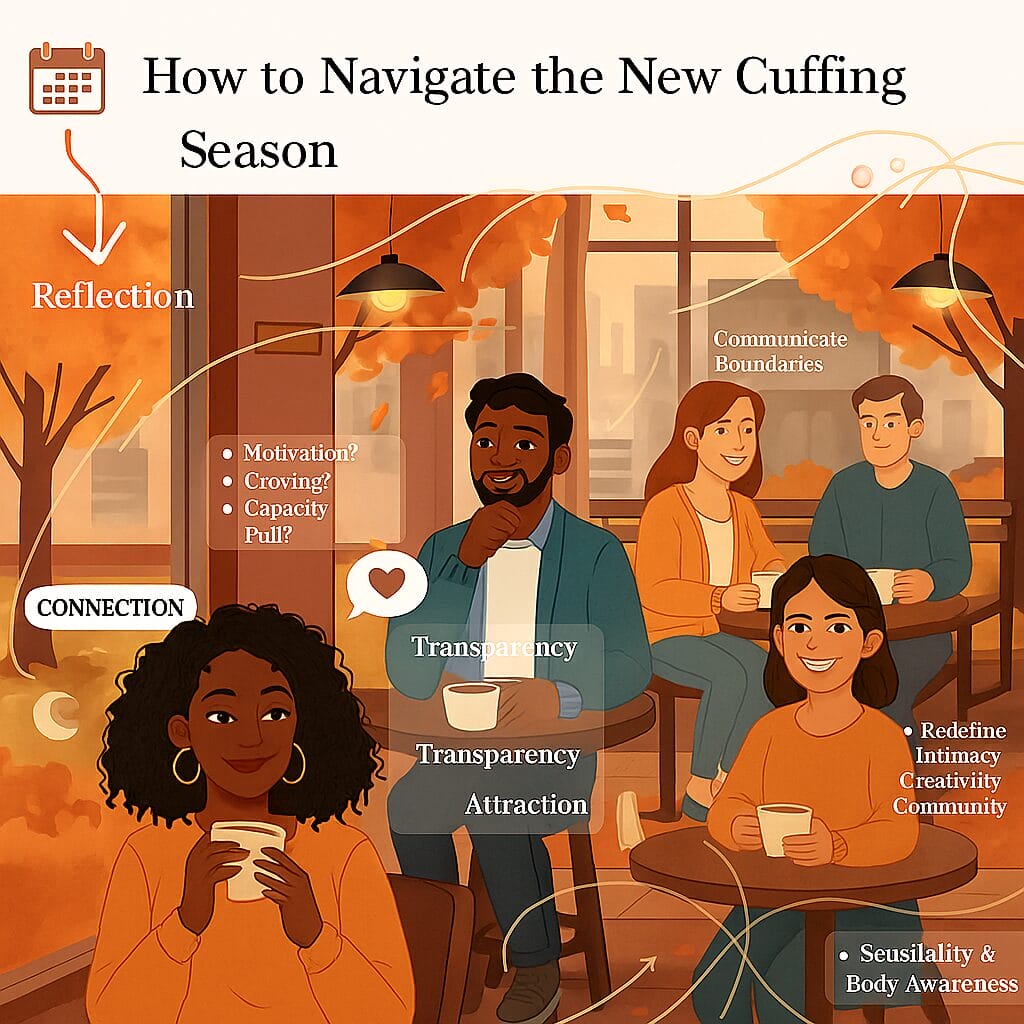
The New Cuffing Season
How Modern Dating Is Redefining Love and Connection
Cuffing season used to be one of the most predictable times of year for dating. The weather cooled down, the holidays rolled in, and suddenly everyone wanted to be “coupled up.” But lately, something has shifted. Articles are asking if it’s even cool to have a boyfriend anymore, and social media is full of commentary about staying single, protecting your peace, and not needing anyone to keep warm. As a psychologist and sex therapist, I find this cultural pivot fascinating because people are changing the way they seek and find love.
The Classic Cuffing Season Story

For years, cuffing season followed a familiar rhythm. As the seasons change and the weather cools down, people are less likely to spend nights out, more likely to crave companionship, and definitely more open to a cozy situationship. Dating apps saw spikes, text threads revived, and exes reappeared out of the blue. The pattern was almost scientific.
Cuffing season appealed to our biological and emotional instincts for comfort and closeness. The colder weather, the social pressure of the holidays, and even loneliness during family gatherings made pairing up feel like a natural response. There’s something deeply human about wanting warmth and connection when everything around you slows down.
However, that seasonal rush to partner up also came with a pattern: many of those relationships faded with the arrival of spring, when the world warmed up again. Cuffing season had a start and an expiration date.
What’s Changing Now

So why does it feel like cuffing season doesn’t hold the same power it once did? The answer lies in the evolution of modern dating and the shifting values around relationships.
Recently, journalist Chanté Joseph wrote a piece asking if it’s embarrassing to have a boyfriend now. The question sparked thousands of comments, debates, and think pieces, and for some, it hit a nerve. Many people, especially younger generations, are rejecting the notion that being in a relationship automatically equates to success or stability.
This cultural shift isn’t about being anti-love; it’s about redefining autonomy and emotional safety. We’re in an era where freedom, self-expression, and boundaries are being prioritized over relationship status. People are less likely to settle just because it’s the holidays and more likely to ask themselves, Does this connection actually feel aligned with who I am?
There’s also a rising awareness around emotional availability and effort. Studies from dating platforms like Hinge show that singles value emotional consistency and communication more than traditional markers like status or income. In other words, people aren’t just cuffing for comfort anymore; they’re looking for depth.
The Psychology Behind the Shift

From a psychological standpoint, this change makes sense. For decades, social pressure has reinforced the notion that being single, especially during the holidays, means you’re missing out on something. That external narrative can activate attachment anxiety, fear of loneliness, and even shame.
But as conversations around mental health and self-worth have expanded, people are learning that being alone doesn’t have to mean being lonely. Independence can actually deepen self-awareness and strengthen future relationships.
As a therapist, I also see another layer here. The rise of mindfulness, therapy culture, and self-work means people are more aware of their patterns. They’re recognizing when they’re seeking comfort versus connection, when a relationship is driven by fear versus genuine desire. That kind of self-awareness changes everything.
The Pros of the New Cuffing Culture

There’s a lot to celebrate about this evolution.
- More intentional relationships: People are taking their time, asking deeper questions, and entering partnerships with clarity.
- Freedom to choose singlehood: There’s less stigma around being single by choice, and more respect for the idea that growth can happen outside of a relationship.
- Emotional maturity: With therapy and communication becoming mainstream topics, people are learning to express needs rather than perform roles.
This shift also opens doors to various relationship models, such as ethical non-monogamy, slow dating, and intentional solo living, all of which can support deeper authenticity.
The Cons and Complications
Of course, every shift has its challenges. The same independence that empowers people can also make it harder to connect. Some fear losing their sense of self in relationships, or they associate intimacy with risk and vulnerability.
Social media doesn’t help. The performative aspect of modern relationships, whether you post your partner, how often, and how others react, has made romance feel public in ways that can create anxiety. It’s no wonder some people feel pressure to keep their relationships hidden or casual.
There’s also what I call emotional burnout from dating fatigue. Many singles describe feeling overwhelmed by choices, detached from emotional investment, or mistrustful of others’ intentions. That can lead to avoidance or skepticism about partnership altogether.
How to Navigate the New Cuffing Season

Whether you’re single, dating, or partnered, this new season invites reflection.
- Check your motivation: Are you craving connection, or are you trying to soothe loneliness? There’s no judgment either way, but awareness helps you choose from intention instead of impulse.
- Be honest about your capacity: If you’re emotionally tired, prioritize restoration before connection. Healthy relationships come from wholeness, not depletion.
- Redefine intimacy: Connection doesn’t have to be romantic. Spend time nurturing friendships, creativity, and community. That still feeds the need for closeness and belonging.
- Practice mindful dating: Approach dating like an exploration, not a performance. Ask yourself if your actions align with your values.
- Communicate boundaries early: Transparency is the new attraction. Clear expectations protect emotional energy for everyone involved.
This is also a powerful time to reconnect with your own sensuality and body awareness. Seasonal changes naturally affect our mood and energy levels, which can impact desire. Reclaiming intimacy with yourself through touch, movement, or creative expression can help you stay grounded through the ups and downs of dating culture.
What This All Means for Modern Love
Cuffing season isn’t gone, but it’s definitely evolving. It reflects how we’re collectively rethinking what love, partnership, and intimacy mean in an age of independence and information overload.
The new cuffing season isn’t about finding someone for the winter. It’s about finding something real, whether that’s a partner who meets you where you are, or a deeper connection with yourself.
As we move into this next season, my advice is simple: approach relationships the same way you approach personal growth, with curiosity, care, and consciousness. The best connections aren’t rushed or seasonal; they’re built through choice, awareness, and the courage to show up authentically, whether you’re cuffed or confidently solo.






